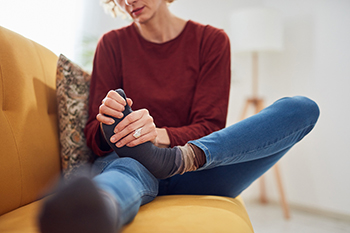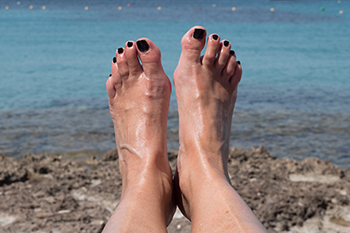Items filtered by date: January 2023
Stretching May Help to Prevent Running Injuries

It is beneficial for people who decide to take up running to learn about how to prevent running injuries. A foot or ankle that becomes injured can cause the running to temporarily stop, and this can affect the beginner or seasoned runner. There are simple methods that can be implemented that are best when practiced daily. It is important to keep the joints, ligaments, and muscles flexible, and this can be done by performing specific stretches. Having strong feet and ankles can cause an imbalance in the knees, possibly incurring a painful injury. Squats are an effective exercise to practice, in addition to lateral leg raises. The back of the leg can become stronger when calf raises are done. This is accomplished by standing on a step, and lowering the heels one at a time until a gentle stretch is felt. For more information about how to prevent running injuries, please speak with a podiatrist who can guide you toward additional stretches to perform.
All runners should take extra precaution when trying to avoid injury. If you have any concerns about your feet, contact Cory Brown, DPM of Cory Brown, DPM. Our doctor will treat your foot and ankle needs.
How to Prevent Running Injuries
There are a lot of mistakes a runner can make prior to a workout that can induce injury. A lot of athletes tend to overstretch before running, instead of saving those workouts for a post-run routine. Deep lunges and hand-to-toe hamstring pulls should be performed after a workout instead of during a warmup. Another common mistake is jumping into an intense routine before your body is physically prepared for it. You should try to ease your way into long-distance running instead of forcing yourself to rush into it.
More Tips for Preventing Injury
- Incorporate Strength Training into Workouts - This will help improve the body’s overall athleticism
- Improve and Maintain Your Flexibility – Stretching everyday will help improve overall performance
- “Warm Up” Before Running and “Cool Down” Afterward – A warm up of 5-10 minutes helps get rid of lactic acid in the muscles and prevents delayed muscle soreness
- Cross-Training is Crucial
- Wear Proper Running Shoes
- Have a Formal Gait Analysis – Poor biomechanics can easily cause injury
If you have any questions, please feel free to contact our office located in Lewiston, ID . We offer the newest diagnostic and treatment technologies for all your foot care needs.
Puncture Wounds and Splinters in the Foot

Splinters are one of the most common and widespread foreign bodies that may enter the bottom, or sole, of the feet. In addition to splinters, pieces of glass are another very common foreign substance that may enter the feet. When a splinter enters the bottom of the foot, it is important that this foreign substance is removed or the foot may become infected. Additionally, it is important that the entire splinter is removed, not leaving part of the substance still in the feet. The deeper a splinter is in the foot, the more difficult it may be for an individual to actually detect the splinter. Often, a medical professional such as a podiatrist may be needed to help identify where a splinter is. This medical professional will then be able to safely remove the splinter. If you are someone that has a splinter in their foot, or believes that they might, consider contacting a podiatrist today for more information and treatment.
Wound care is an important part in dealing with diabetes. If you have diabetes and a foot wound or would like more information about wound care for diabetics, consult with Cory Brown, DPM from Cory Brown, DPM. Our doctor will assess your condition and provide you with quality foot and ankle treatment.
What Is Wound Care?
Wound care is the practice of taking proper care of a wound. This can range from the smallest to the largest of wounds. While everyone can benefit from proper wound care, it is much more important for diabetics. Diabetics often suffer from poor blood circulation which causes wounds to heal much slower than they would in a non-diabetic.
What Is the Importance of Wound Care?
While it may not seem apparent with small ulcers on the foot, for diabetics, any size ulcer can become infected. Diabetics often also suffer from neuropathy, or nerve loss. This means they might not even feel when they have an ulcer on their foot. If the wound becomes severely infected, amputation may be necessary. Therefore, it is of the upmost importance to properly care for any and all foot wounds.
How to Care for Wounds
The best way to care for foot wounds is to prevent them. For diabetics, this means daily inspections of the feet for any signs of abnormalities or ulcers. It is also recommended to see a podiatrist several times a year for a foot inspection. If you do have an ulcer, run the wound under water to clear dirt from the wound; then apply antibiotic ointment to the wound and cover with a bandage. Bandages should be changed daily and keeping pressure off the wound is smart. It is advised to see a podiatrist, who can keep an eye on it.
If you have any questions, please feel free to contact our office located in Lewiston, ID . We offer the newest diagnostic and treatment technologies for all your foot care needs.
Wounds That Don't Heal Need to Be Checked
Why Do My Feet Hurt?

The feet provide shock absorption to the body, and foot pain is often difficult to ignore. Research has shown that approximately 75 percent of people across the country will have some type of foot pain at different points in their lives. There are various reasons why foot pain can occur, including wearing shoes that do not fit correctly, and poor foot function and pain have been linked to obesity. Additionally, the feet can change as the aging process occurs, possibly causing the connective tissue to loosen, which may cause pain and discomfort. Specific medical conditions can cause foot pain, consisting of bunions, ingrown toenails, and Achilles tendonitis. Patients who are afflicted with a broken foot, plantar warts, or gout may experience foot pain, and prompt medical attention is often sought. There are many reasons to have this type of pain, and it is important that the cause is determined, which is followed by beginning the correct treatment. Mild treatment techniques can include wearing cushioned shoes, massaging the feet, and frequently elevating the affected foot. If you have foot pain for any reason, it is strongly urged that you are under the care of a podiatrist who can effectively determine the reason why, and offer the treatment option that is right for you.
Foot Pain
Foot pain can be extremely painful and debilitating. If you have a foot pain, consult with Cory Brown, DPM from Cory Brown, DPM. Our doctor will assess your condition and provide you with quality foot and ankle treatment.
Causes
Foot pain is a very broad condition that could be caused by one or more ailments. The most common include:
- Bunions
- Hammertoes
- Plantar Fasciitis
- Bone Spurs
- Corns
- Tarsal Tunnel Syndrome
- Ingrown Toenails
- Arthritis (such as Gout, Rheumatoid, and Osteoarthritis)
- Flat Feet
- Injury (from stress fractures, broken toe, foot, ankle, Achilles tendon ruptures, and sprains)
- And more
Diagnosis
To figure out the cause of foot pain, podiatrists utilize several different methods. This can range from simple visual inspections and sensation tests to X-rays and MRI scans. Prior medical history, family medical history, and any recent physical traumatic events will all be taken into consideration for a proper diagnosis.
Treatment
Treatment depends upon the cause of the foot pain. Whether it is resting, staying off the foot, or having surgery; podiatrists have a number of treatment options available for foot pain.
If you have any questions, please feel free to contact our office located in Lewiston, ID . We offer the newest diagnostic and treatment technologies for all your foot care needs.
Rock Climbing and Foot Injuries

About half of all acute injuries sustained in rock climbing involve the legs and feet. Often these injuries happen from falls to the ground or rocks hitting a person during a fall. Rock climbers can suffer from strains, contusions, and fractures to the feet that can stop them from participating in this enjoyable activity for some time. Wearing shoes that are too tight can lead to overstrain injuries that can increase stress on the forefoot during rock climbing. If you are a rock climber and want more information about protecting your feet and ankles while participating in your sport, or if your lower extremities have been injured, consult with a podiatrist.
Sports related foot and ankle injuries require proper treatment before players can go back to their regular routines. For more information, contact Cory Brown, DPM of Cory Brown, DPM. Our doctor can provide the care you need to keep you pain-free and on your feet.
Sports Related Foot and Ankle Injuries
Foot and ankle injuries are a common occurrence when it comes to athletes of any sport. While many athletes dismiss the initial aches and pains, the truth is that ignoring potential foot and ankle injuries can lead to serious problems. As athletes continue to place pressure and strain the area further, a mild injury can turn into something as serious as a rupture and may lead to a permanent disability. There are many factors that contribute to sports related foot and ankle injuries, which include failure to warm up properly, not providing support or wearing bad footwear. Common injuries and conditions athletes face, including:
- Plantar Fasciitis
- Plantar Fasciosis
- Achilles Tendinitis
- Achilles Tendon Rupture
- Ankle Sprains
Sports related injuries are commonly treated using the RICE method. This includes rest, applying ice to the injured area, compression and elevating the ankle. More serious sprains and injuries may require surgery, which could include arthroscopic and reconstructive surgery. Rehabilitation and therapy may also be required in order to get any recovering athlete to become fully functional again. Any unusual aches and pains an athlete sustains must be evaluated by a licensed, reputable medical professional.
If you have any questions please feel free to contact our office located in Lewiston, ID . We offer the newest diagnostic and treatment technologies for all your foot and ankle needs.
Foot Health and Electrolytes

Anyone should know that protecting your feet is one of the most important and often overlooked aspects of maintaining a healthy lifestyle. One way that individuals might go about protecting the health of their feet is by monitoring certain levels of nutrients and minerals in the body. Electrolytes, for instance, have an important effect on the health of the feet. Electrolytes are a type of mineral in the blood of the body, and they play an important role in managing the level of water that is in your body at any given time. When electrolytes are at a low level, the feet may experience certain changes. For instance, low electrolytes might translate into increased muscle cramps. There are many ways that an individual can go about preventing this. People with low electrolyte levels can increase their level of electrolytes by eating foods such as bananas, spinach, or kidney beans. It is very important to be mindful of one’s electrolyte levels at all times to monitor the connection that it has with the health of the feet. Please contact a podiatrist for more information about this important topic.
Everyday foot care is very important to prevent infection and other foot ailments. If you need your feet checked, contact Cory Brown, DPM from Cory Brown, DPM. Our doctor can provide the care you need to keep you pain-free and on your feet.
Everyday Foot Care
Often, people take care of their bodies, face and hair more so than they do for their feet. But the feet are a very important aspect of our bodies, and one that we should pay more attention to. Without our feet, we would not be able to perform most daily tasks.
It is best to check your feet regularly to make sure there are no new bruises or cuts that you may not have noticed before. For dry feet, moisturizer can easily be a remedy and can be applied as often as necessary to the affected areas. Wearing shoes that fit well can also help you maintain good foot health, as well as making it easier to walk and do daily activities without the stress or pain of ill-fitting shoes, high heels, or even flip flops. Wearing clean socks with closed shoes is important to ensure that sweat and bacteria do not accumulate within the shoe. Clean socks help to prevent Athlete’s foot, fungi problems, bad odors, and can absorb sweat.
If you have any questions please feel free to contact our office located in Lewiston, ID . We offer the newest diagnostic and treatment technologies for all your foot and ankle needs.

